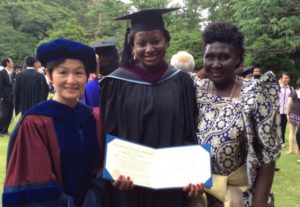Interview with JICUF Scholarship Recipient: Christine Nalubowa

Program Director Tara DeWorsop recently had a chance to interview Christine Nalubowa. Christine received her BA and MA from ICU, and is a recipient of scholarship support from the Japan ICU Foundation and Rotary Yoneyama.
Tara DeWorsop: Thank you for agreeing to this interview. To get started, can you share a highlight from your time at ICU?
Christine Nalubowa: When one arrives at International Christian University, it doesn’t take long to realize why it’s one of the best universities in the world. The generally green environment is amazing, as is the support to international students. ICU staff members are very nice and helpful and the students are incredibly friendly. Many cultural events take place not only on campus, but also in the nearby parks, which makes ICU definitely an ideal place to study, research, and have a great time.
It’s surprising that there are not more Africans at ICU – I hope this review will help recruit more African students so that we can make ICU even more international!
Tara: I agree! So, please tell me a couple things you learned that most impacted your life?
Christine: ICU provided me with a bilingual education in both English and Japanese. It also provided me with access to a variety of programs that connected me with the world outside Japan. There were also ample opportunities to study and share views with students from different countries and background.
I am now working with Japanese people and I don’t find any problems expressing myself and communicating with others.
Throughout my six years at ICU, I have acquired the ability to think critically and make reasoned judgments toward events happening around the world. Due to ICU’s emphasis on critical thinking, I can now fulfill my responsibilities based upon my newfound international knowledge and skills.
ICU is a Christian university and that aspect of it has encouraged me to open my eyes to the presence and power of God in my daily life. I have learned that acquiring knowledge is not an end in itself – there is also a need for faith in my Christian religion.
Tara: Do you have any ICU faculty or administrator that greatly influenced/guided you during your time at ICU? If so, who and how?
Christine: Dr. Giorgio Shani, my advisor in the Department of Politics and International and Relations, had me join his seminar group. He taught me so much and offered me all the support that I needed for my research. He is dedicated to combining responsible and quality research with meaningful arguments.
Dr. Malarney Shaun, Dean of International Affairs also guided me through my applications to ICU’s Graduate School and helped me with my master’s thesis research.
Tara: Did you join any clubs or get involved in any activities outside of the classroom? If so, what were they and how did they impact your time at ICU?
Christine: Due to my busy intensive Japanese Language program, I found it difficult to get involved in any clubs. But during my free time, I played tennis with friends at ICU.
Tara: That sounds like fun! Can you tell me what you would change about ICU if you could?
Christine: I think that I would change ICU by making it more international; by encouraging more students from African countries. ICU cannot be called fully ‘international’ when there are only 3 students from Africa attending right now.
I also think that, while ICU being bilingual is very good, the Japanese language program is too hard and can make students so busy they may struggle to find time to enjoy their university life. So, I would keep the intensity of the Japanese language program that really teaches a lot, but decrease the Japanese language units that are required for graduation.
Tara: I understand. What did you focus your studies on? Has it related to your career and future goals in any way?
Christine: For my undergraduate degree at ICU, I studied development studies. This relates to my career because I am interested in the development of African countries – mainly Uganda. I am very interested in learning how I can support Ugandans through education to lead the country toward greater development.
For graduate school, I took International Relations and my master’s thesis was on the causes of human insecurity in northern Uganda. This relates to my career in the future because I want to work with NGOs that deal with both development and security in Africa to ensure that lives are changed in a positive way.
Tara: What are you planning to do now that you have graduated from ICU?
Christine: I have started work already. I work with Ashinaga Organization. An NGO which supports orphans worldwide.
Tara: That’s great! Please share some advice for current ICU students – undergraduate or graduate level.
Christine: Undergraduate students at ICU (International students) should learn how to balance their time between their major courses and Japanese language.
Graduate students should start their master thesis research earlier and they should know that it is important to do a field research in order for them to pass the thesis defense exam.
Tara: Are there any parting words or thoughts you would like to share with JICUF and/or the North American constituency of alumni and friends?
Christine: I would like to send my appreciation for the support I have received from JICUF and I will keep in touch. I will use my education to change the lives of unprivileged children in Uganda.



